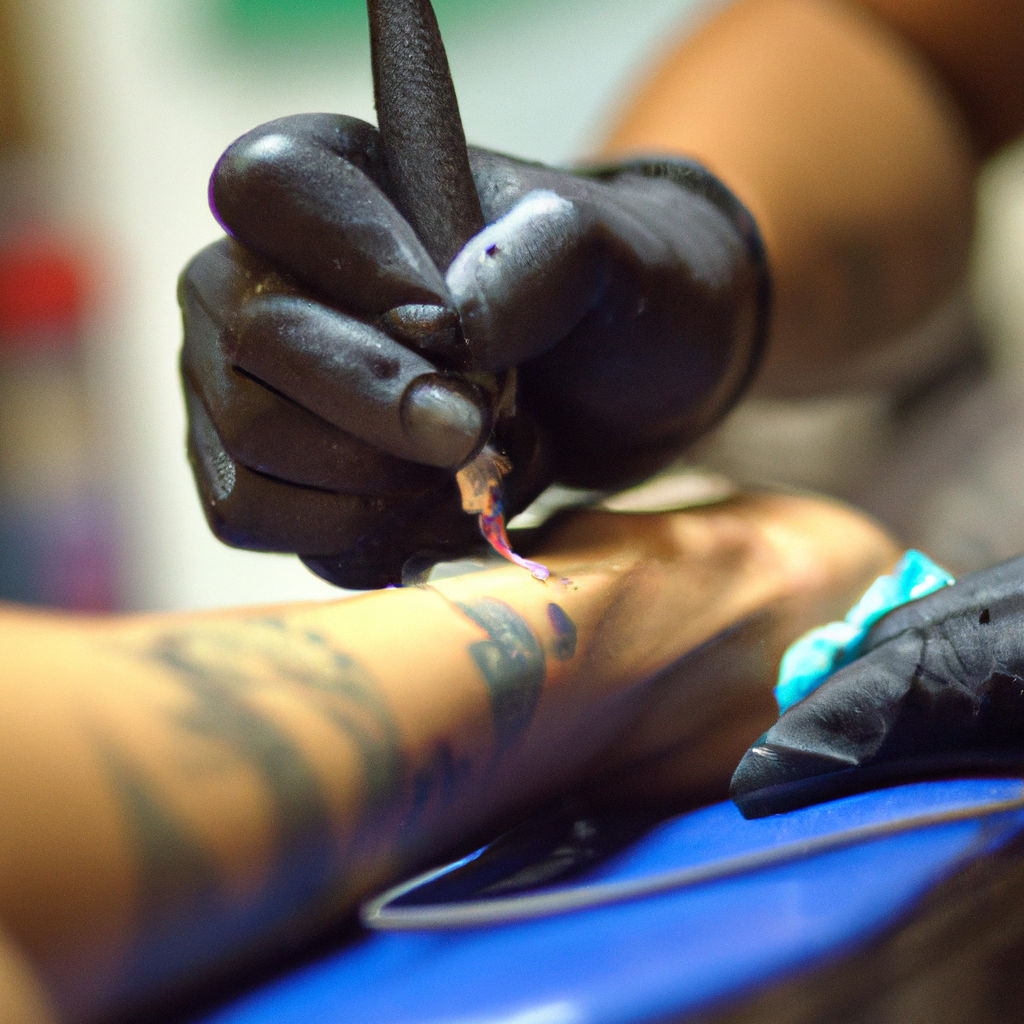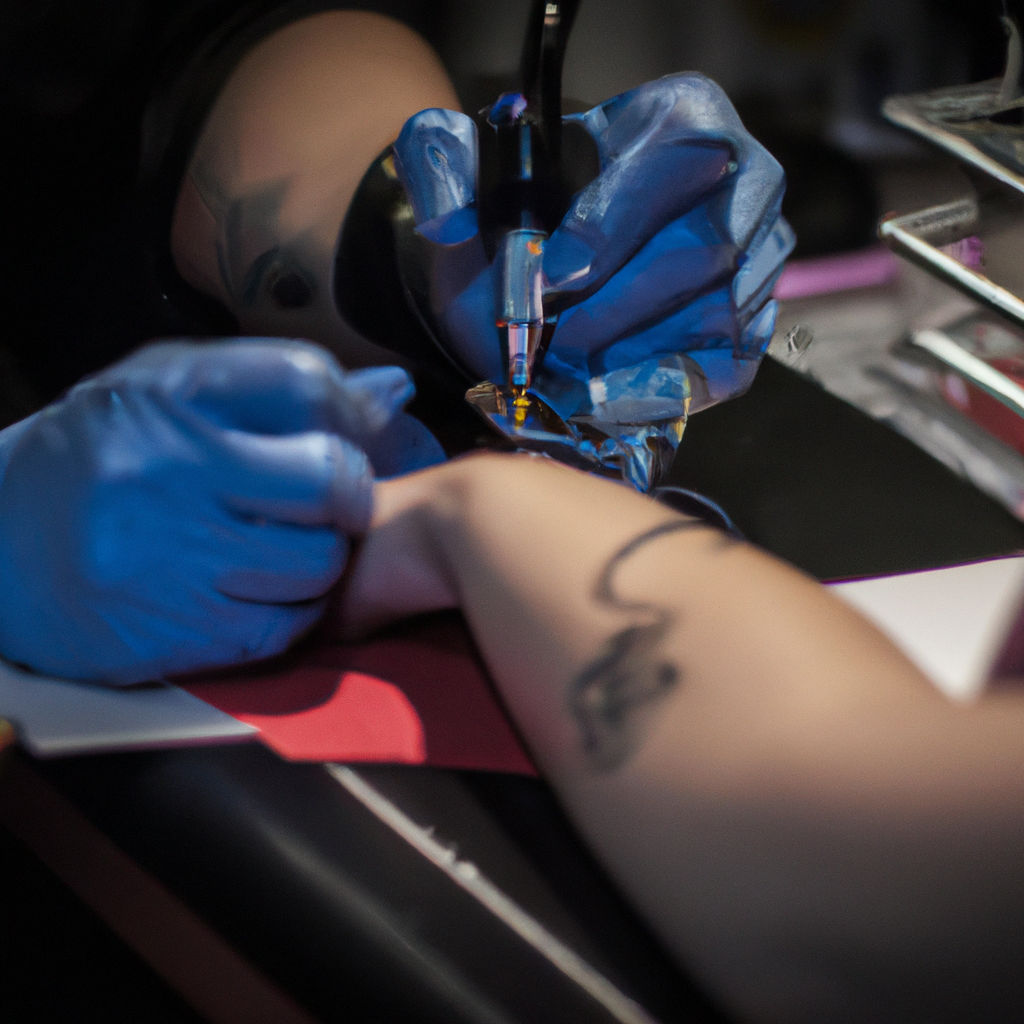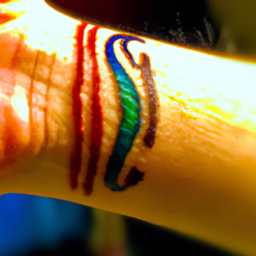“Cultural Significance of Hebrew Script in Contemporary Tattoo Art”
Hebrew script holds a deep cultural and historical significance. It is used to communicate one of the most ancient languages in the world, which has been orally transmitted for centuries. With its roots in the Phoenician alphabet, Hebrew script has survived through various iterations and continues to remain relevant in contemporary literature, design, and art forms.
A Historical Peek into Hebrew Script
From its emergence in the 12th century BCE, the Hebrew script has held a special place in global history. Originally a variant of the Phoenician script, it was adopted by the Jewish people and modified over time to suit the phonetics of the Hebrew language. Over the centuries, the Hebrew script evolved, with changes in form and style influenced by political, cultural, and religious shifts. Today, it serves as a testament to the resilience of the Jewish culture and its enduring legacy.
In religious context, Hebrew script finds usage in the Torah, the Jewish holy book, and is considered sacred. This also imbues it with a certain aesthetic and symbolic meaning, making it often sought after in various art forms, even beyond Jewish communities. Its significance is increasingly recognized by societies around the world and this recognition becomes evident in the trending world of contemporary tattoo art.
Hebrew Script in Contemporary Tattoo Art
The interest in tattooing has grown substantially in recent years, leading to the exploration of novel themes and designs – and the incorporation of Hebrew script is one such intriguing trend. Tattoos, from being seen as rebellious or taboo, have transitioned into a widely accepted form of personal expression and art.
Hebrew script, with its unique and eye-catching calligraphy, is being increasingly incorporated in tattoo designs. Besides the aesthetic appeal, such tattoos also embody deep spiritual or cultural meanings for many. By choosing to tattoo Hebrew script, individuals carry a piece of ancient history with them, paying homage to their heritage or connecting with the profound ideologies associated with the Hebrew language.
Hebrew script tattoos are the perfect fusion of the ancient and modern worlds, combining traditional sentiments and the contemporary art form. This integration has created a vibrant space where tradition and modernity seamlessly intertwine, enriching the world of tattoo art. As this trend continues to grow, so does our need for understanding and appreciating the profound cultural nuances and legal implications involved in tattooing Hebrew script.
The Incorporation of Hebrew Script in Tattoo Art
From adornment to self-expression, tattoos have served various purposes throughout human history. Today, the tattoo culture has evolved considerably, and tattoos bearing Hebrew script have taken central stage, especially in the vibrant world of contemporary skin art. Hebrew scripts, with their historical significance and inherent mystery, often resonate with deep personal and societal symbolism. These Kabbalistic elements add an air of enigma while enhancing the aesthetic charm of the inked artwork.
Why Choose Hebrew Scripts?
There are several reasons individuals choose Hebrew scripts for their tattoos. First and foremost, it serves as an enduring form of identification and expression of Jewish faith or cultural heritage. Hebrew script tattoos may also represent literary or philosophical quotes that hold profound personal significance for the bearer. For others, the script’s aesthetic appeal is enough inspiration to get it etched on their bodies. Depicting strength, faith, love, truth, and other virtuous concepts, these tattoos often exemplify the individual’s deeply held beliefs.
Meaning Behind Popular Hebrew Script Tattoos
The meanings behind Hebrew script tattoos vary significantly, largely due to the richness of the language itself. Some popular choices are phrases from the Bible, personal names, and expressions such as “I am that I am,” “Live the moment,” or “Love Eternal.” Hebrew letters, such as the first letter of the alphabet, Aleph, are also popular choices. Each character, in addition to their phonetic value, holds a numerological and symbolic significance, making the tattoos multi-layered in meaning.
Legal Consideration of Tattoos
Tattooing is a complex and multidimensional practice that includes legal considerations, especially when it involves incorporating someone else’s art or copyrighted material.
A Brief Overview of Legal Aspects
Generally speaking, obtaining a tattoo is a legal activity for adults in most parts of the world. However, there are laws surrounding the age of the recipient, the hygiene standards of the tattoo studio, and the proper discardment of used needles.
Copyright Concerns for Script Tattoos
Script tattoos, especially those inspired by popular texts, poses certain copyright concerns. In many licenses, the only usage of a work that infringes on a copyright is “copying,” which broadly includes the adaptation of the work into another form. However, the personal and noncommercial nature of tattoos creates a gray area in copyright law. Although cases of copyright infringement over tattoo designs are rare, it’s advisable to consult a knowledgeable source before getting a piece of copyrighted material tattooed. To avoid litigation, consultations with a professional are always encouraged to ensure the chosen Hebrew script is appropriately used and understood.

Hebrew Script Tattoos and their Representation of Identity
Understanding the essence of identity can be quite complex, since it encompasses several facets including culture, religion, and even personal beliefs. In the realm of contemporary tattoo art, Hebrew script tattoos have emerged as a profound representation of cultural, religious and personal identity.
People choose Hebrew script tattoos for a myriad of reasons. Some individuals opt for this unique form of expression to honour their Jewish heritage. Others use it as a modern way to exhibit their love for the ancient language, or appeal to its spiritual significance. There’s also a considerable number who simply appreciate the aesthetic uniqueness of the Hebrew script.
Yet, the importance of comprehending Hebrew script prior to getting a tattoo can hardly be overstated. Owing to its profound historical and religious context, Hebrew script carries sacred implications. Therefore, understanding its nuances is paramount to avoid any potential disrespect or misappropriation.
The Influence of Hebrew Script Tattoos on Popular Culture
Delving into the role of Hebrew script tattoos in popular culture, its influence is quite noticeable. Several celebrities and influencers, including football star David Beckham and pop singer Victoria Beckham, proudly flaunt Hebrew script tattoos. Their visibility has unarguably popularised these tattoos, fuelling their charm among the masses.
The impact of popular culture on Hebrew script tattoo trends is undeniable. As more celebrities embrace this form of art, their followers often replicate these tattoos. This has somewhat elevated Hebrew script tattoos from being solely a cultural or religious symbol to a representation of modern pop culture.
However, it’s essential to remember that Hebrew script tattoos carry significant meaning and shouldn’t be reduced to mere aesthetics. Both tattoo artists and their clients should ensure an understanding and respect for the cultural and religious connotations of the script. This promotes responsible practices and averts undesirable consequences.
Whether used to declare identity, or as an accessory to pop culture, Hebrew script tattoos continue to pique interest through their beautiful detailing and rich connotations. As this trend continues to evolve, one can only anticipate what new interpretations and expressions it will bring. Ultimately, the fusion of culture, art, and identity remains a guiding motif in this form of self-expression.
Misinterpretations and Misappropriations of Hebrew Script Tattoos
In the world of body art, tattoos in Hebrew script hold a certain allure, thanks to their elegant design and deep, spiritual meaning. However, this esoteric script has often been misinterpreted or misused, leading to scenarios of embarrassment, and at times, serious legal issues.
In a bid to demystify Hebrew script tattoos, it’s crucial to draw attention to case studies that showcase misused or misinterpreted Hebrew script. These often arise from individuals eager to etch deep, meaningful words onto their skin, without adequate knowledge of the Hebrew language or script. For instance, one of the most commonly misinterpreted Hebrew script tattoos is the phrase, “Shalom”. Those unfamiliar with the language might interpret this word as “peace”, not realizing it can also mean “hello” and “goodbye”.
Implications & Legal Issues
In addition to causing embarrassment for the recipient, these misinterpretations could potentially lead to legal troubles. For instance, there have been cases where individuals unwittingly get the names of trademarked businesses or copyrighted phrases tattooed in Hebrew script. Without proper consultation with a linguistic expert, one can easily violate copyright laws, resulting in hefty fines and legal repercussions.
The Business Aspect of Hebrew Script Tattoos
While misinterpretations and misappropriations present an issue, they fail to dampen the burgeoning demand for Hebrew script tattoos. A rising trend within the world of contemporary tattoo art, this demand inherently impacts the business dynamics of tattoo parlors.
Catering to a market that seeks intricate, meaningful body art, tattoo artists who can accurately ink Hebrew script are often in high demand. To meet this demand and ensure accuracy, many practitioners have started including linguistic consultation in their service offerings, often collaborating with experts who can affirm the accuracy of the intended tattoo design.
Impact on Tattoo Parlors
This trend has not only increased the popularity of Hebrew script tattoos but also significantly impacted the business of tattoo parlors. As they churn out precise, beautiful Hebrew tattoos, these establishments have seen a spike in their clientele, bolstering their profit margins. However, it has also necessitated their commitment towards responsible practice, promoting a deeper understanding of the script to prevent any future misinterpretations and misappropriations.
In conclusion, while Hebrew script tattoos ignite substantial interest in today’s tattoo art market, they also open conversations about the importance of linguistic and cultural understanding in this thriving, dynamic industry.

Ethical Considerations and Controversies Surrounding Hebrew Script Tattoos
The inclusion of Hebrew script in tattoo art raises a myriad of ethical considerations and controversies. Notwithstanding the prevailing acceptance of tattoos in contemporary society, the use of religious and cultural symbols as bodily adornments occasionally triggers disagreements and heated debates. This is especially the case with Hebrew script tattoos due to the profundity and sanctity ascribed to the ancient writing system by Jewish and even non-Jewish communities.
Religious Implications of Tattooing Hebrew Script
Biblical teachings in Leviticus 19:28 prohibit the scarring or tattooing of the body in Jewish traditions. Hence, adherents to the faith who opt for Hebrew script tattoos could potentially be infringing upon these religious prohibitions. Despite this, Judaism’s perspective on tattoos isn’t universally rigid, with reformist and progressive Jewish movements being more accepting of this form of body art.
The Sensitivities Involving Hebrew Script Tattoos
Underneath these ethical debates, important sensitivities exist. Without an adequate grasp of the language and symbolism inherent in Hebrew script, misinterpretations can occur, resulting in tattoos that convey unintended or offensive messages. Given the language’s intricate grammatical rules and script orientation, it’s essential for both tattoo artists and their clients to ensure accuracy before inking.
A general rule that applies to all forms of tattoo art, particularly those involving cultural or religious symbols, is the practice of respect. Tattoos are a visible and permanent form of self-expression. Therefore, they should be chosen with care, and involve a deep understanding of their meaning and cultural significance to avoid the risk of cultural appropriation or offending cultural sensitivities.
Through a better understanding and acknowledgment of these ethical considerations and controversies surrounding Hebrew script tattoos, the tattoo industry can continue to evolve while still respecting the cultural and religious significance of these symbols.

Throughout this discourse, the remarkable importance of Hebrew script tattoos within the realm of contemporary art has been underscored. Recognizing their role as not just a fashion trend, but as a conspicuous representation of cultural, religious, or personal identity, has added a novel layer of comprehension around these unique symbols.
As we’ve delved into the various elements associated with Hebrew script tattoos, from the historical perspective to its widespread use in popular culture, it’s clear that such tattoos are far more than mere aesthetics. They serve as powerful statements of individuality or as tools for conveying deep-rooted beliefs and values. Misinterpretations or misuse of these significant script tattoos, as we’ve seen, can lead to legal implications and can potentially offend those who regard these symbols as sacred, emphasizing the need for comprehension and respect regarding their usage.
The burgeoning popularity of Hebrew script tattoos has undoubtedly influenced the business of tattoo parlors, mirroring the surge in demand and consumer interest. However, this has also led to ethical controversies, forcing us to reassess the boundaries that might or should exist when it comes to inking cultural or religious symbols on our bodies. Is it merely an expression of appreciation or a risky venture into cultural appropriation?
In conclusion, the narrative surrounding Hebrew script tattoos is far from simple or straightforward. They are entrenched in layers of cultural significance, legal considerations, and ethical dilemmas. Encouraging responsible practices while getting or giving such tattoos becomes crucial to maintaining respect and inclusivity in the field of contemporary art. Whether it is about understanding the true meaning of the script, abiding by copyright laws, or comprehending the potential cultural or religious offense, being well-informed is your best bet against any unintended negative consequences.
Ultimately, Hebrew script tattoos are a powerful testament to the beauty and depth of a language, its culture, and the myriad ways it can be expressed and appreciated.
